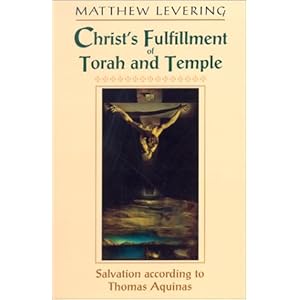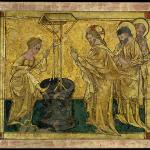
In Part I, I asked Dr. Levering some fairly personal questions about life as a theologian. Here, in Part II, we pursue some thornier questions concerning the vocation of the theologian in the life of the Church. Two of those questions resulted in follow-up questions. As this was an e-interview, I had originally sent 10 questions at once, so none of my subsequent questions were determined by Dr. Levering’s responses. The two follow-up questions are indicated below by the block quote function. They are the only instances where my questions were shaped by Dr. Levering’s previous answers.
I want to once again thank Dr. Levering for agreeing to this interview. Enjoy!
Brett: How do you understand the vocation of the theologian? What role (or roles) does the theologian have in ecclesial life?
Dr. Levering: I see the theologian as a relatively small part of ecclesial life, viewed from one perspective at least. The Church is about the love of God and neighbor, and the intellectual life is not as significant, concretely speaking, as are the lives of all Catholics engaged in following Christ through the assistance of the pastors of the Church. Theologians can strongly overinflate their importance. On the other hand, the theologian has an important role in contemplation and in serving the Church’s evangelization and catechesis. The theologian assists the Church in bringing out treasures old and new from the gift of divine revelation.
Brett: What is the responsibility of a theologian who, despite his or her best efforts, is convinced that Church teaching is lacking or even erroneous in a given area? Or, put more positively, what is the role of the theologian in the development of doctrine? Are these two questions two sides of the same coin or not? How so?
Dr. Levering: If the Church’s teaching is lacking, then it can be developed so that this lack is filled in. Quite often, this is what the development of doctrine consists in, and it is a valuable task of the theologian. Theological dissent is another matter. Here the problem gets more complicated, because of the unity of revelation. If the Church were not a trustworthy guide on faith and morals, a trustworthy interpreter of divine revelation, then all we could have would be religious studies in the sense of diverse constructions of the best guesses of various theologians. Protestantism attempts to address this problem by focusing on the authority of the Bible. When Catholics reject both the authority of the Bible and the authority of the Church as guided by the Holy Spirit to mediate divine revelation, then it becomes hard to see how the theological task can be sustained. There will always be areas where individual theologians do not see how the Church’s teaching can be true, i.e. do not follow the Church’s arguments. Since theology is a vast field, the theologian can focus his or her efforts in areas where he or she understands the Church’s teaching more clearly. There can be difficult situations where a theologian is persuaded that the Church is in error, but the theologian will not wish to undermine the Church’s mediation of divine revelation. To be a theologian is primarily an act of receptivity, as is to be a Christian.
Brett: Even if we grant that the Church is a trustworthy guide, is it possible that a given theologians’s difficulty with a teaching might stem from inadequate arguments that need critique? In such cases what is the theologian’s role? In other words, can critique be done faithfully and responsibly? If so, what does that look like?
Dr. Levering: If we grant that the Church is a trustworthy guide, then we have taken a huge step beyond the polarity of conservative/liberal and we have returned the discussion to the domain of revelation, where Catholic theology can properly be done. This step is absolutely crucial. In a culture where this step is quite often neglected, we can easily neglect to pursue the intelligibility of the Church’s teachings as theologians. Once we cut doctrines from their context in revelation, it becomes highly difficult to prove their truth to our satisfaction — as would be expected given that theological claims go beyond philosophical demonstration. It can hardly be emphasized enough that this trouble occurs not only with the “hot-button” issues that are used to divide the Catholic theological world into “conservative” and “liberal.” On the contrary, the Marian doctrines, the doctrine of God, Jesus’ sinlessness, the saving efficacy of the Cross, the Resurrection, original sin and so forth are the doctrines that I have first in mind.That said, having reminded ourselves again of the context in which this question is being discussed, there will always be the problem of the Church employing inadequate arguments. In such cases, the problem is not that the Church’s teaching is wrong, but that it is inadequate or lacking. When the Church’s teaching is lacking, the theologian can make arguments that seek to address this lack and thereby to develop doctrine. A good test of whether development is actually occurring — or whether it is the theologian’s arguments that are lacking — is to see whether the theologian’s arguments cohere with the principles that the Church uses in other doctrines, with Scripture, with the doctrinal commitments of the Councils, and so forth.To this I would add that the development of doctrine is not the theologian’s first task, and is not something that a theologian sets out at first to do. The situation at present requires emphasizing this point even more. The task of contemplating and handing on the faith is the central labor of the theologian. Only in this way can a sense of revealed truth be retained.
Brett: There has been a great flourishing of popular catechetics and apologetics in North American Catholicism in recent years. Many theologians are concerned about the quality of this catechesis, sometimes finding it superficial or full of anti-Protestant polemic. Many have voiced the opinion that some of the worst distortions come from former Protestants who are responding strongly to the faith community they left without always fully understanding the worldview of their new faith community. On the other hand, many credit this new catechetics with a renewal of their faith. What are your thoughts on the state of popular catechetics and apologetics? How does this work relate to the work of the academic theologian? What can academic theologians do to help promote authentic Catholic catechesis at the popular level? Must there always be some divide between the theological faculties and the people in the pews? How can such a divide be addressed?
Dr. Levering: Fortunately, the Catechism of the Catholic Church, which has proven to be quite popular, ensures that authentic Catholic catechesis is available today. As one who has a strong awareness of the difficulty of popular writing, since I’m no good at it myself, I admire those who try to convey Catholic doctrine authentically in a popular genre. If I were to identify a concern regarding theological quality, I would hesitate to blame the apologetical writers, since the quality of academic theology in Catholic circles can be quite low. It is always discouraging to find another academic book or article by a Catholic theologian that seeks to do away with a Catholic doctrine, not simply on the “hot-button” issues but on everything from the Trinity onward. Clearly not all academic Catholic theology is like this, but as a Catholic theologian, my concern would be directed first to the current state of academic Catholic theology, and only secondly to the relatively more minor difficulties with contemporary Catholic popular writing.
Brett: I note with some chagrin the length of my first question. I took much too long to get to my point. It is clear that you are more concerned with heterodoxy among academic theologians than with lack of subtlety among popular catechists. Fair enough. I still wonder, though, if you see room for collaboration between (let’s presume orthodox) academic theologians and popular writers? How can the academic theologian aid the work of popularizers? How can popularizers be responsible to the best of academic theology?
Dr. Levering: My view here is that perhaps the “missing link”, in the question at least, may be the Catechism of the Catholic Church. The Catechism was the work of academic theologians, and yet it has also caught on among a popular audience. To answer the question further, however, I would add that academic theologians need to write on doctrines and to have popular audiences in mind, even when writing to fellow scholars. Academic theology can easily get caught up with the latest trends in sociology, politics, economics, and so forth, so that it becomes unfashionable to write books that discuss actual doctrines of the Catholic faith. At the same time, popular Catholic writers should seek training in academic theological programs and should apprentice themselves to Scripture and the doctors of the Church. Just as academic theologians should write academic theology with an eye to how a wide audience could receive it, so also popular theologians should be guided by the judgment of academic theology under the unifying aegis of the Church’s Magisterium.
Brett: Many more traditional Catholics are suspicious of work in ecumenism and interreligious dialogue. Often ecumenists are chastised that they should be doing apologetics, not ecumenism. Unless I am mistaken, you would be very happy to identify as a “traditional” Catholic. Yet you work in ecumenism (especially with evangelicals) and interreligious dialogue (especially with the Jewish people). How would you express the value of this work to those who see it as contrary to the missionary impetus of the church and a concession to relativism and pluralism? What, in your view, is the relationship between ecumenical dialogue and apologetics?
Dr. Levering: I am greatly interested in ecumenical dialogue and Jewish-Christian dialogue. When one comes to know one’s neighbor, it is right to talk first about what one has in common with the neighbor, rather than first confronting the neighbor with a challenge regarding the areas in which one disagrees with the neighbor; to act in this way belongs to love of neighbor. Catholics have a large number of faith commitments that we share with evangelical Christians. The same can be said, although in a different way, with Jews. There is no need in these discussions to pretend that we agree more than we do, and these discussions do not have as their purpose the minimizing or dissolving of differences. Pope John Paul II and Pope Benedict XVI have shown a path that I believe to be the right one, a path that accords with not only Vatican II, but also with the way that Aquinas treated with respectful interest the thought of Aristotle and Maimonides. The missionary task does not thereby fall away. Love of neighbor includes presenting the fullness of faith to the neighbor. Yet the love of neighbor would be sorely constricted, to say the least, if we viewed our evangelical Christian and Jewish neighbors as people with whom we could have no conversation other than to instruct them.
Brett: I understand you are currently working on a project concerning God’s providence. Can you tell us a bit about this project? Why has the question of God’s agency become important in contemporary theology? Who are some of the thinkers you engage in this project? What do they have to contribute to our current understanding?
Dr. Levering: I do have a book on predestination coming out this year from Oxford University Press. In this book, I treat issues related to God’s agency and discuss Scripture in light of the approaches of sixteen thinkers, four from the patristic period, four medieval, four Reformation/Baroque, and four twentieth-century (thus from Origen to Hans Urs von Balthasar). The topic of God’s agency has always been a central one for Christians, because at its core it has to do with God’s power to save, and with the truth that God has a plan for us and he will see it to fulfillment. That God’s wise and good eternal plan cannot ultimately be frustrated is very important for trusting ourselves to God. If we do not trust God, we cannot experience any real kind of peace.
Brett Salkeld is a doctoral student in theology at Regis College in Toronto. He is a father of two (so far) and husband of one.
















